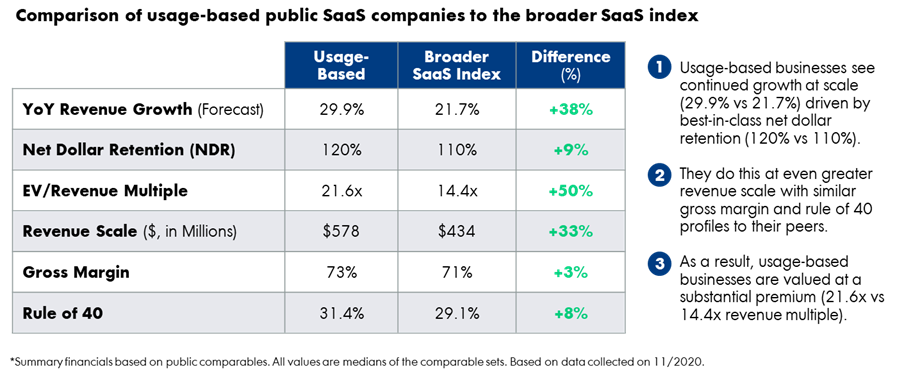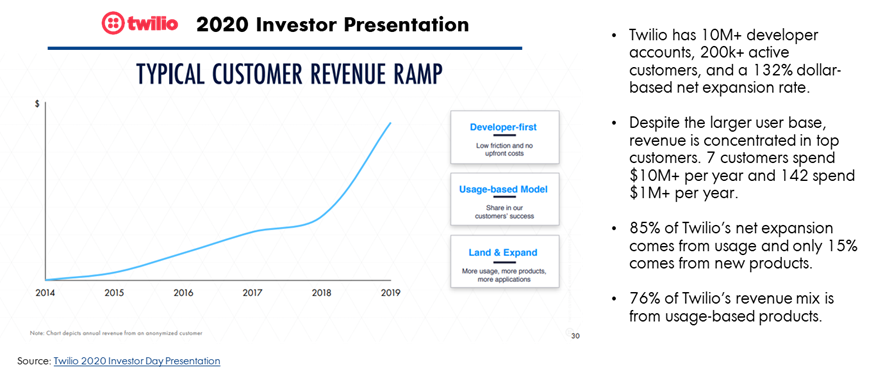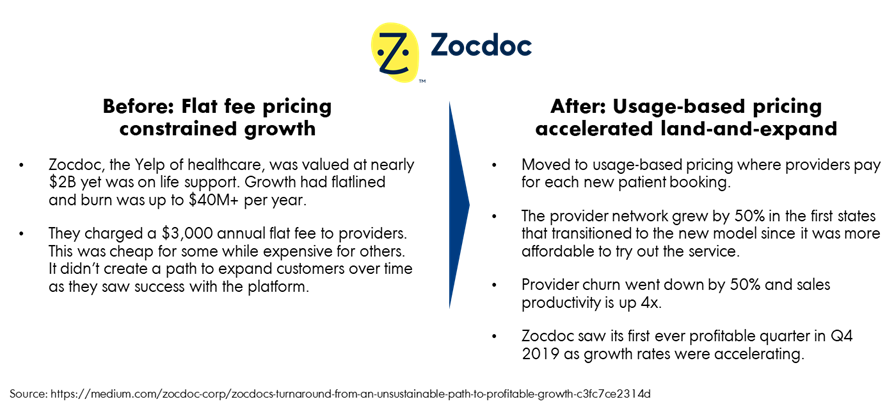Kyle Poyar
Today we know of HubSpot — the maker of marketing, sales and service software products — as a preeminent public company with a market cap above $17 billion. But HubSpot wasn’t always on the IPO trajectory.
For its first five years in business, HubSpot offered three subscription packages ranging in price from $3,000 to $18,000 per year. The company struggled with poor churn and anemic expansion revenue. Net revenue retention was near 70%, a far cry from the 100%+ that most SaaS companies aim to achieve.
Something needed to change. So in 2011, they introduced usage-based pricing. As customers used the software to generate more leads, they would proportionally increase their spend with HubSpot. This pricing change allowed HubSpot to share in the success of its customers.
By the time HubSpot went public in 2014, net revenue retention had jumped to nearly 100% — all without hurting the company’s ability to acquire new customers.
HubSpot isn’t an outlier. Public SaaS companies that have adopted usage-based pricing grow faster because they’re better at landing new customers, growing with them and keeping them as customers.

Widen the top of the funnel
In a usage-based model, a company doesn’t get paid until after the customer has adopted the product. From the customer’s perspective, this means that there’s no risk to try before they buy. Products like Snowflake and Google Cloud Platform take this a step further and even offer $300+ in free usage credits for new developers to test drive their products.
Many of these free users won’t become profitable — and that’s okay. Like a VC firm, usage-based companies are making a portfolio of bets. Some of those will pay off spectacularly — and the company will directly share in that success.
Top-performing companies open up the top of the funnel by making it free to sign up for their products. They invest in a frictionless customer onboarding experience and high-quality support so that new users get hooked on the platform. As more new users become active, there’s a stronger foundation for future customer growth.
Twilio, the communications API company, allows developers to start building for free without being limited in what capabilities they can use. This has attracted more than 10 million developer accounts. Despite the massive user base, Twilio’s revenue is concentrated in very large customers. They have seven customers who spend $10 million+ per year and 142 who spend $1 million+ per year.

Grow with your existing customers
In a usage-based model, expansion “just happens” as customers are successful. There’s no requirement for lengthy contract negotiations or counting user seats. It’s no wonder that public SaaS companies with the strongest net revenue retention are disproportionately likely to employ usage-based pricing.
The name of the game is to invest in activities that are leading indicators of customer health. Two to keep top of mind are adoption of collaboration features and integrations with third-party applications. Both bring in additional users from the same account, making the software more ubiquitous and seeding the discovery of new use cases.
Compliance software company AuditBoard, which charges based on the number of controls rather than users, generates 10x the number of users in an account compared to legacy software. Monetization comes after the customer has seen value rather than acting as a gating mechanism.
Keep more customers
In subscription SaaS businesses, the annual contract renewal is fraught with anxiety. It’s a binary decision for the customer that happens behind closed doors without much transparency for the vendor. Once a customer has churned off the platform, it’s extremely difficult to win them back.
Contract renewal is almost a nonevent for a usage-based business. The customer is constantly choosing how much and when to use the product. They only pay when they’ve seen results.
Healthcare marketplace Zocdoc initially charged doctors an annual $3,000 flat fee for access to the platform. While this price point was considered cheap for some, others found it extremely expensive given the results they were seeing. In 2017 the company shifted to a usage-based model where doctors pay based on each new patient booking. Churn has since decreased by 50%. Since the customer’s spend is now right-sized based on their exact results, they have no reason to leave the platform at the end of a contract.

Top performing usage-based companies know that customer experience must be top of mind 365 days out of the year — not just at renewal. They are consistently monitoring adoption behavior, investing in new features to make the product more valuable and proactively addressing any accounts that seem at-risk before it becomes a problem.
Getting started: It’s not all or nothing
SaaS companies don’t have to immediately ditch traditional subscription pricing to capitalize on these benefits. Start out by introducing an entry-level plan with a usage limit to give new users a chance to try out your product. DocuSign, which charges on a per-user basis, has a limit of five documents per month for its entry-level Personal plan. From there, invest in product analytics tooling to monitor what users do in the product and gain visibility into the health of accounts before churn happens.
Both of these simple changes put usage front and center in the way a company lands, expands and retains users — a mindset shift that will facilitate sustainable revenue growth.
Subscription-based pricing is dead: Smart SaaS companies are shifting to usage-based models































Comment